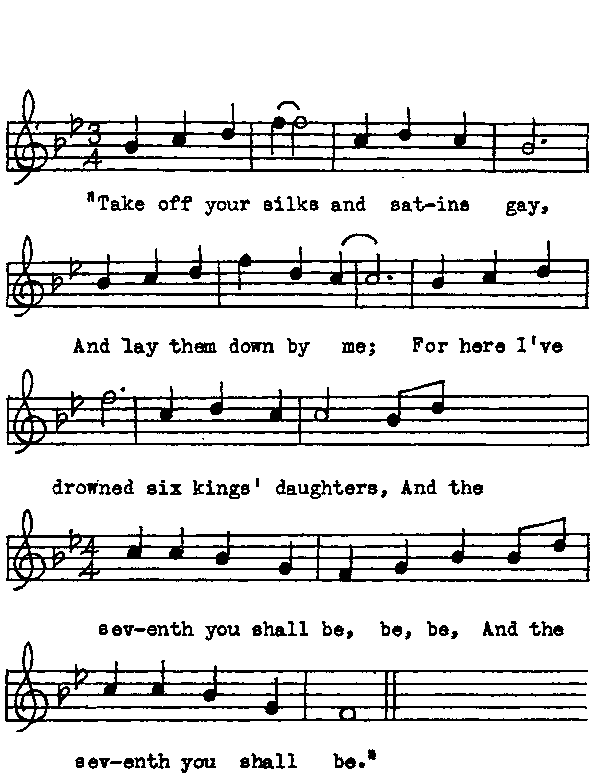Six Kings' Daughters- Raley (IN) 1935 Brewster C
[Brewster: Ballads and Songs of Indiana, 1936; Brewster's notes follow.
R. Matteson Jr. 2014]
LADY ISABEL AND THE ELF-KNIGHT (Child, No. 4)
The widespread currency of this ballad not only in the British Isles and America but also in Continental Europe led Child to write of it: "Of all ballads this has perhaps obtained the widest circulation." Only three variants have been recovered in this state, however. They are closest perhaps to Child E, although the name Polly does not occur in that text and is found only in F. In other texts the heroine is May Colvin (Colven) or May Collin. Her reminding the false lover of his promise of marriage occurs in none of the Child versions. The name William does not appear in the texts of Child; there the lover is Sir John. It is possible, however, that the William of our Indiana variant is a corruption of villain. The turning three times around is not found in any of the Child versions.
For American texts, see Belden, No. 1 (fragment); Brown, p. 9; Campbell and Sharp, No. 2; Cox, No. 1 (fragment); Hudson, No. 1; Mackenzie, Ballads, No. 1; Scarborough, p. 43; Shearin, p. 3; Shearin and Combs, p. 1; Smith, Ballads, No. 1; Wyman and Brockway, p. 82; Sandburg, p. 60; Journal, XVIII, 132; XIX, 232; XXII, 65, 76, 374, 344; XXIV, 333; XXVII, 90; XXVIII, 148; XXX, 286; XXXV, 338; XLII, 254; XLIX, 213 (Missouri); Fauset, Folk-Lore from Nova Scotia, p. 109; PTFLS, X, 138; Gordon, Folk-Songs of America, p. 8; Cox, Traditional Ballads, Mainly from West Virginia, pp. 1-5; Henry, Folk-Songs from the Southern Highlands, p. 32; BFSSNE, I, 3 (New Hampshire); Randolph, Ozark Mountain Folks, p. 216.
English and Scottish texts will be found in Broadwood and Maitland, English County Songs, p. 164 (with air); Roxburghe Ballads, VII, 383; Dixon, Ancient Poems, Ballads, and Songs of the Peasantry of England (London, 1846), p. 74; Greig, Last Leaves, p. 2 (with air); Burne, Shropshire Folk-Lore, p. 548; JFSS, I, 246; II, 282; IV, 116, 374.
For a Hungarian version, "Molnar Anna," see Buday, George, and Giles Ortutay, Szekely Nepballadak No. 25. Manx analogues, "Illiam Bogt" and "Cur uss Jeed," appear in JFSS, VII, 300-301.
Local titles for this ballad are "Six Kings' Daughters" and "Pretty Polly." It is sometimes known also as "The False Lover."
C. "Six Kings' Daughters." Contributed by Mrs. B. C. Raley, of Greencastle, Indiana. Putnam County. Learned from the singing of her mother. November 21, 1935. With music.
SIX KING'S DAUGHTERS

1. He followed me up; he followed me down;
He followed me wherever I'd go.
I had not the heart to turn him back,
Nor the tongue to tell him, "No, no, no,"
Nor the tongue to tell him, "No."
2. She got up on her pony[1] white horse,
And he on a dappled gray;
And they rode till they came to the broad waterside,
Six long hours before day, day, day,
Six long hours before day.
3. "Take off your silks and satins so gay
And lay them down by me;
For here I've drowned six kings' daughters,
And the seventh you shall be, be, be,
And the seventh you shall be."
4. "Then turn your face to yon willow tree,
And turn your back on me";
..................................
..................................
.................................
5. She caught him round the small of the back;
She hooved [2] him in the sea,
Saying, "Here you've drowned six kings' daughters,
But the seventh never shall be, be, be,
But the seventh never shall be."
6. She got up on her pony white horse
And led the dappled gray,
And she rode till she came to her own father's house,
Three long hours before day, day, day,
Three long hours before day.
7. "Now, hush you up, you pretty poll-parrot,
And tell no tales on me;
Your nest shall be lined with the yellow beaten gold,
And hung in the willow tree, tree, tree,
And hung in the willow tree."
1. For bonny.
2. For heaved or hove